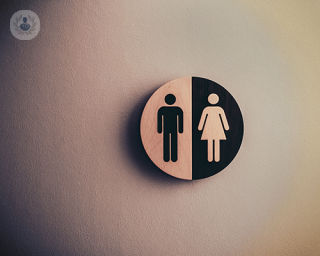What is stress incontinence?
Stress incontinence is when urine leaks out at times when your bladder is under physical pressure for example if you laugh or cough, run, sneeze or lift something heavy. Stress incontinence occurs is much more common in women than in men.
The condition can impact your mental health, you may at times feel embarrassed, isolate yourself, or limit your social and work life, especially leisure and exercise activities.
What are the causes of urinary incontinence?
It’s usually the result of either damage to the muscles such as the urethral sphincter or pelvic floor muscles used to prevent urination or the weakening of them.
The bladder expands as it fills with urine. Usually, valve-like muscles in the urethra stay closed as the bladder expands. It prevents urine leakage until you reach a toilet.
However, if these muscles weaken, anything that adds pressure on the pelvic and abdominal muscles can cause pressure on your bladder and cause you to leak urine.
Factors that can increase the risk of developing stress incontinence can include the weakening of muscles. If you’re obese or overweight, the excess weight can increase pressure on the abdominal and pelvic organs.
Prostate surgery is one of the most common causes of stress incontinence in men. When the prostate gland is removed (prostatectomy) to treat prostate cancer this may result in a weakened sphincter.
In women, childbirth can weaken the pelvic floor muscles or the sphincter can weaken because of nerve or tissue damage during the delivery of a child. Stress incontinence from this can occur years later or soon after the birth of the child. Hysterectomies can also cause stress incontinence. Some connective tissue disorders (for example Ehlers Danlos syndrome) and neurological conditions that affect the spinal cord and brain can also cause urinary incontinence.
How can stress incontinence be treated?
Strategies
There are a variety of treatment strategies to end or reduce the number of incontinence episodes.
- Pelvic floor muscle exercises – These movements can strengthen your pelvic floor muscles and urinary sphincter.
- Changes to lifestyle – Losing excess weight, treating a chronic cough and quitting smoking, for example, can lessen episodes of stress incontinence
- Training your bladder – Scheduling times to empty your bladder can reduce the severity or number of incontinence episodes.
- Fluid consumption – You may be recommended a certain amount and be given times when you’re allowed to.
- Medication – If you’re unsuitable for surgery or want to avoid having an operation, you may benefit from a medication called duloxetine.
- Devices – Certain devices designed for women may help control stress incontinence
Various surgeries can be carried out to treat stress incontinence, these include colposuspension, sling surgery and vaginal mesh surgery.
Other options can include Urethral bulking agents for women which increases the size of the urethra so it stays closed with more force. An artificial urinary sphincter can also help relieve incontinence.
11-12-2019Stress incontinence
What is stress incontinence?
Stress incontinence is when urine leaks out at times when your bladder is under physical pressure for example if you laugh or cough, run, sneeze or lift something heavy. Stress incontinence occurs is much more common in women than in men.
The condition can impact your mental health, you may at times feel embarrassed, isolate yourself, or limit your social and work life, especially leisure and exercise activities.
What are the causes of urinary incontinence?
It’s usually the result of either damage to the muscles such as the urethral sphincter or pelvic floor muscles used to prevent urination or the weakening of them.
The bladder expands as it fills with urine. Usually, valve-like muscles in the urethra stay closed as the bladder expands. It prevents urine leakage until you reach a toilet.
However, if these muscles weaken, anything that adds pressure on the pelvic and abdominal muscles can cause pressure on your bladder and cause you to leak urine.
Factors that can increase the risk of developing stress incontinence can include the weakening of muscles. If you’re obese or overweight, the excess weight can increase pressure on the abdominal and pelvic organs.
Prostate surgery is one of the most common causes of stress incontinence in men. When the prostate gland is removed (prostatectomy) to treat prostate cancer this may result in a weakened sphincter.
In women, childbirth can weaken the pelvic floor muscles or the sphincter can weaken because of nerve or tissue damage during the delivery of a child. Stress incontinence from this can occur years later or soon after the birth of the child. Hysterectomies can also cause stress incontinence. Some connective tissue disorders (for example Ehlers Danlos syndrome) and neurological conditions that affect the spinal cord and brain can also cause urinary incontinence.
How can stress incontinence be treated?
Strategies
There are a variety of treatment strategies to end or reduce the number of incontinence episodes.
- Pelvic floor muscle exercises – These movements can strengthen your pelvic floor muscles and urinary sphincter.
- Changes to lifestyle – Losing excess weight, treating a chronic cough and quitting smoking, for example, can lessen episodes of stress incontinence
- Training your bladder – Scheduling times to empty your bladder can reduce the severity or number of incontinence episodes.
- Fluid consumption – You may be recommended a certain amount and be given times when you’re allowed to.
- Medication – If you’re unsuitable for surgery or want to avoid having an operation, you may benefit from a medication called duloxetine.
- Devices – Certain devices designed for women may help control stress incontinence
Various surgeries can be carried out to treat stress incontinence, these include colposuspension, sling surgery and vaginal mesh surgery.
Other options can include Urethral bulking agents for women which increases the size of the urethra so it stays closed with more force. An artificial urinary sphincter can also help relieve incontinence.


Artificial urinary sphincter surgery for the relief of urinary incontinence
Mr Rowland Rees
2024-11-19
Urinary incontinence refers to the involuntary passage of urine, a common problem that affects up to 3 million people in the UK. If you suffer from severe urinary incontinence, however, the implantation of an artificial urinary sphincter can help to resolve symptoms and improve quality of life. Here, Mr Rowland Rees, renowned consultant urologist and male genito-urethral surgeon, provides an expert insight into artificial urinary sphincter surgery. Mostrare di più


An expert guide to bladder problems
Miss Victoria Asfour
2024-11-14
Highly esteemed consultant gynaecologist and obstetrician Miss Victoria Asfour shares her expert insight on common bladder and urinary problems and the lifestyle modifications which can help to resolve them in this informative article. Mostrare di più


Overactive bladder in women: ask an expert
Mr Arvind Vashisht
2024-11-09
An overactive bladder is a relatively common condition. How do we define an overactive bladder? What causes it and how can it be treated. Leading gynaecologist Mr Arvind Vashisht explains all you need to know. Mostrare di più


Empowering women to live well: Treating the aftereffects of childbirth
Dr Alexander Bader
2024-11-05
Vaginal relaxation is a common problem affecting women as a consequence of childbirth or changes that occur during the menopause. In this article, expert gynaecologist and specialist obstetrician Dr Alexander Bader, renowned for his innovative surgical methods in reconstructive and cosmetic vaginal procedures in Europe, outlines the treatment options available for women. Mostrare di più
Medici esperti in Stress incontinence
-
Mr Azar Khunda
Ginecologia e OstetriciaEsperto in:
- Stress incontinence
- Uroginecologia
- Infezione del tratto urinario
- Prolasso genitale
- Vescica iperattiva
- Problemi della vescica
-
Miss Nadia Rahman
Ginecologia e OstetriciaEsperto in:
- Pavimento pelvico
- Prolasso genitale
- Stress incontinence
- Infezione del tratto urinario
- Problemi della vescica
-
Dr Aneta Obloza
Ginecologia e OstetriciaEsperto in:
- Uroginecologia
- Prolasso genitale
- Stress incontinence
- Incontinenza urinaria
- Problemi della vescica
- Cistite
-
Mr Rajagopalan Sriram
UrologiaEsperto in:
- Cancro alla vescica
- Stress incontinence
- Ematuria
- Infezione del tratto urinario
- Vasectomia
- Vasovasostomia
-
Mr Nicholas Faure Walker
UrologiaEsperto in:
- Ipertrofia benigna della prostata
- Vescica iperattiva
- Incontinenza urinaria nelle donne
- Infezione del tratto urinario
- Stress incontinence
- Prostata
- Visualizzare tutti

Westminster Gynaecology
Westminster Gynaecology
Westminster Consulting Rooms, Guys and St Thomas’ Hospital, Westminster Bridge Rd
No existe teléfono en el centro.
Se utilizzi questo numero di Top Doctors autorizzi al trattamento dei dati a fini statistici e commerciali. Per maggiori informazioni, leggi la nostra l’informativa sulla privacy
Top Doctors

HCA UK at The Shard
HCA UK at The Shard
32 St Thomas Street, SE1 9BS
No existe teléfono en el centro.
Se utilizzi questo numero di Top Doctors autorizzi al trattamento dei dati a fini statistici e commerciali. Per maggiori informazioni, leggi la nostra l’informativa sulla privacy
Top Doctors

The Harley Street Clinic - part of HCA Healthcare
The Harley Street Clinic - part of HCA Healthcare
35 Weymouth Street, London. W1G 8BJ
No existe teléfono en el centro.
Se utilizzi questo numero di Top Doctors autorizzi al trattamento dei dati a fini statistici e commerciali. Per maggiori informazioni, leggi la nostra l’informativa sulla privacy
Top Doctors
-
Westminster Gynaecology
Westminster Consulting Rooms, Guys and St Thomas’ Hospital, Westminster Bridge Rd, Central LondonEsperto in:
- Clinica di screening del cancro
- Endometriosi
- Fibromi
- Ginecologia e Ostetricia
- Incontinenza urinaria
- Menopausa
-
HCA UK at The Shard
32 St Thomas Street, SE1 9BS, Central LondonEsperto in:
- Angiologia e Chirurgia vascolare
- Il cancro della testa e del collo
- Cancro al seno
- Chirurgia ortopedica
- Chirurgia Toracica
- Clinica di screening del cancro
-
The Harley Street Clinic - part of HCA Healthcare
35 Weymouth Street, London. W1G 8BJ, Central LondonEsperto in:
- Tumori
- Il cancro della testa e del collo
- Cardiologia
- Terapia intensiva
- Diagnostica per immagini
- La salute delle donne
- Visualizzare tutti







